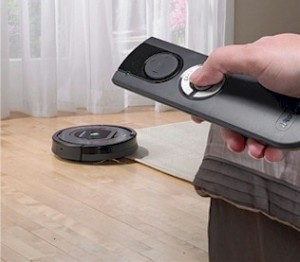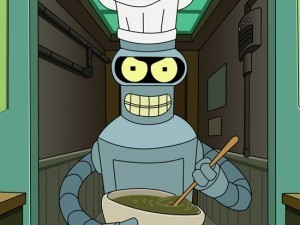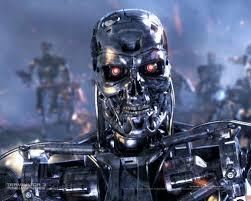Hail, Mighty Robot Army!
 When I was a little kiddie, I used to draw robots for my mum and explain how they’d do all her housework one day. Mostly, this quaint notion came from the comics and sci-fi novels of the time, so some of my robots hovered and had hose-like limbs, they could talk, and they were friendly, autonomous and very cute.
When I was a little kiddie, I used to draw robots for my mum and explain how they’d do all her housework one day. Mostly, this quaint notion came from the comics and sci-fi novels of the time, so some of my robots hovered and had hose-like limbs, they could talk, and they were friendly, autonomous and very cute.
Well, my mum died 25 years ago and the nearest she got to a domestic robot was a washing machine with selectable programs.
 I mention this because, a week ago, I ordered my own first robot off the Internet and it arrived yesterday. It’s a Roomba automatic vacuum cleaner. It bumbles around the floor, bumping into furniture and walls and sucking up dirt. It does the job it was bought for – surprisingly well – but, honestly, it’s a pretty poor excuse for a robot. Its sensorium is extremely limited, it’s capabilities more so, and its intelligence… Let’s just say, I’ve seen smarter cockroaches. But it set me thinking, remembering my mum, my childhood dreams of the future, and my own career in IT R&D – which included several years of academic and industrial research in artificial intelligence.
I mention this because, a week ago, I ordered my own first robot off the Internet and it arrived yesterday. It’s a Roomba automatic vacuum cleaner. It bumbles around the floor, bumping into furniture and walls and sucking up dirt. It does the job it was bought for – surprisingly well – but, honestly, it’s a pretty poor excuse for a robot. Its sensorium is extremely limited, it’s capabilities more so, and its intelligence… Let’s just say, I’ve seen smarter cockroaches. But it set me thinking, remembering my mum, my childhood dreams of the future, and my own career in IT R&D – which included several years of academic and industrial research in artificial intelligence.
People talk about the present with disappointment. “Where’s my flying car?” they ask. It’s a joke but, really, they feel let down. We didn’t move into space, we don’t have jet-packs, the modal age at death still hovers between eighty and ninety years, and there are still no cities under the sea. Where we have made progress – in the miniaturisation of electronic devices (especially computers), the improvement of telecommunications technologies, and the manipulation of nano-scale objects (particularly biological molecules) – people are mostly unimpressed. Yes, there’s the Internet, that’s great for watching films and playing games, yes we can carry our phones in our pockets – or, at least, we could once before they started turning into phablets – and, sure, someone cloned a sheep or something, and digital cameras are handy, but where’s my robot maid? Why can’t I take vacations on Mars? And shouldn’t we have teleporters by now?
 And how come our stuff isn’t all that much better than our grandparents had? Fifty years ago, they already had jetliners and helicopters, computers and telephones, submarines and rockets, electricity and nuclear power, quantum theory and relativity, lasers and organ transplants. They already had plastic and antibiotics and TVs with remote controls and concrete skyscrapers and automated factories. Did progress stop when the Beatles sang “Love Me Do”? Has there been nothing new in the world for three generations except smartphones and microwave ovens?
And how come our stuff isn’t all that much better than our grandparents had? Fifty years ago, they already had jetliners and helicopters, computers and telephones, submarines and rockets, electricity and nuclear power, quantum theory and relativity, lasers and organ transplants. They already had plastic and antibiotics and TVs with remote controls and concrete skyscrapers and automated factories. Did progress stop when the Beatles sang “Love Me Do”? Has there been nothing new in the world for three generations except smartphones and microwave ovens?
I blame sci-fi writers for raising our expectations. If a few more of them had known a bit more science and technology, they wouldn’t have come up with so many stupid ideas that clearly couldn’t work without radical theoretical breakthroughs, or materials that were impossible in the foreseeable future – or any future. I also blame the rise of monetarism – you know, that laissez faire capitalist crap that teaches us the price of everything and the value of nothing – and consolidated ownership of the media (which killed democracy). There were – have always been – sci-fi writers predicting perfectly feasible and very exciting futures but most voters would prefer that the 1% gets richer than that we use our resources to fuel a bright tomorrow.
 But let’s get back to the robots.
But let’s get back to the robots.
Today, the world is full of robots. There are probably more than 9 million of them at the moment – mostly working in factories and 72% of those are in Japan and Europe. But here’s the thing, they are all stupid. All of them. Compared to most robots, my Roomba is a genius. The problem isn’t with the robots’ bodies (although the engineering problems have always been grossly underestimated) but with their brains. If there is one field of endeavour which has consistently failed to deliver to expectations – or at all, really – it is artificial intelligence. Yes, we have a chess-playing machine that can beat a human, we even have a Jeopardy! playing machine that can beat a human, but these super-specialised devices took thousands of hours of hand-crafting by top-flight technicians. To get a robot to wash the dishes is still beyond even this kind of concerted effort. To get a robot to wash the dishes and put them away is a pipe-dream. We could easily wait another fifty years for something that clever to emerge.
 Of course, we’re scanning brains and building monster, billion-euro brain simulations right now, but, you know what? In ten years they’ll be saying, “Right! Now we’ve learnt all the things we didn’t know when we started, we’re ready to do it properly this time. Can we have another billion euros please?” And we still won’t be any closer to understanding what intelligence is, let alone being able to reproduce it in a machine.
Of course, we’re scanning brains and building monster, billion-euro brain simulations right now, but, you know what? In ten years they’ll be saying, “Right! Now we’ve learnt all the things we didn’t know when we started, we’re ready to do it properly this time. Can we have another billion euros please?” And we still won’t be any closer to understanding what intelligence is, let alone being able to reproduce it in a machine.
So, as much as I’d like to draw robots for my daughter and tell her they’ll do all her housework for her one day, I will refrain. There is no point in disappointing yet another generation. She grew up in a world of specialist appliances with amoeba-level intelligences and she’ll probably grow old with them too – only there’ll be more of them. Today, I’ve got a “smart” washing machine, a retarded vacuuming machine, a car that knows enough to mitigate some of the worst excesses of its driver, and I’m thinking of getting a floor washing robot and one of those cute little squeegee-weilding bots that crawls around your windows on suckers.
Maybe my daughter will have a dish-washing bot and a cooking bot and a car that drives itself – and a lot of extra cupboards and alcoves to store her army of smart machines in.



